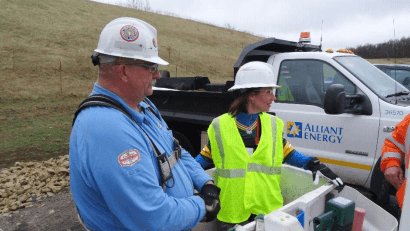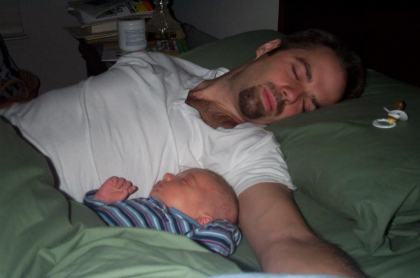This is my husband and our third son Jackson. How many of you remember those awful first weeks after you brought your newborn home?
It’s not just new parents and newborns though, 40% of Americans say they routinely don’t get enough sleep.
[Back to Debbie]
When your colleagues show up fatigued, you see more injuries and more missed days at work, higher health care costs, and deadlier car crashes.
Over time, there’s a major risk for health conditions like Alzheimer’s, heart disease, diabetes, and even cancer.
[Back to Debbie]
How many of you are tired this morning?
Show of hands if you got less than 5 hours of sleep last night?
While most companies have a zero tolerance for drinking on the job, we all but ignore fatigue. But just two fewer hours of sleep than normal can have the same impairing effect as drinking a few beers. There are quite a few impaired people here this morning.
[Back to Debbie]
Years ago, I didn’t fully appreciate the impact of running on empty. But after a decade of reviewing incidents and accident reports, I get it.
Out of everything we can control, good sleep can make an immediate impact on performance.
When I was at the National Transportation Safety Board, fatigue came up again and again as one of the top contributing factors in our investigations. Standard protocol was looking back at least 72 hours, to get a complete picture of when people had opportunities to rest, and when they didn’t.
On February 12, 2009, we investigated a regional jet crash on approach to Buffalo around 11 pm.
Let me tell you what you’re going to see.
First, you’ll see speed in the upper left. Watch as the speed decays over the next 60 seconds.
At about 175 knots the gear will be lowered.
At about 130, the shaker will activate for the first time and the autopilot will disengage.
You’ll see the stick shaker and pusher activate multiple times. These are automated systems designed to prevent an aerodynamic stall.
Roll video.
No one survived. 50 people perished that day. It remains the deadliest U.S. crash in over a decade.
[Back to Debbie]
What if I told you that the night before that the first officer commuted on a redeye cargo flight from Seattle to Memphis, and Memphis to Newark just to get to work?
What if I told you the captain spent the previous night in the crew lounge, but because management didn’t want anyone sleeping there, they set the lights to stay on all night?
If your family was on that flight, would you think the pilots were in top form?
When you do safety investigations, do you consider things like time of day, and work-rest schedules to get to the root cause of an on-the-job incident?
We are all asked to make tough choices and operate in a 24/7 environment. We all think we can just power through.
But when we’re fatigued, our decision making and performance takes a nose dive.
[Back to Debbie]
Have you ever found yourself running on empty? Everybody please stand up.
If you’ve ever pulled an all-nighter or worked a night shift - Take a seat.
If you’ve driven through the night - Take a seat.
If you’ve ever fallen asleep while watching a football game. And yes, Thanksgiving counts! Take a seat.
Is anyone left standing? If you’ve sacrificed sleep for a work deadline, please take a seat.
Looks like we all need to refuel.
We see it as a badge of honor that we can function on little sleep, and get more done. But that’s a myth.
The U.S. military, probably more than anyone, has studied how sleep deprivation affects performance, and they found that soldiers who slept 4, 5, or 6 hours could initially hit more targets with those extra hours awake and on duty.
But after only two days, their performance dropped.
The less they slept, the worse they performed. Think about what this means for you or your workforce. Sleep is critical.
Putting in more hours on the job does not always equal better results.
[Back to Debbie]
With us today is Dr. Charles Czeisler, from Harvard Medical School.
To professional athletes he’s known as the Sleep Doctor.
He helps VIPs from the NBA to NASA maximize their sleep schedules so they can perform at peak condition.
Dr. C treats superheroes like Shaq for sleep disorders such as sleep apnea that affects 1 out of every 3 men. Ladies, we are more at risk for insomnia. Unfortunately, most sleep disorders go undiagnosed and untreated.
[Back to Debbie]
Why? Because we take sleep for granted.
As safety leaders, you can help shift gears on fatigue.
I know you’re up to the challenge.
You’ve made workplaces nine times safer than our homes. Give yourselves a round of applause for that.
But we can do more.
There are three steps you can take right now to refuel your workforce.
Think schedules, sleep, and screenings.
Step one: schedules. Make sure employees have enough time to get adequate rest. Minimize overnights, doubles, and shifts that rotate backwards as much as possible.
Step two. Educate your employees on the importance of sleep health so they create good sleep habits. Dr. Czeisler will be doing a fatigue session later today.
Step three - Screen for sleep disorders. This summer, we did this at NSC. Best practice is to screen and support treatment.
Sleep health has a major ROI for companies. Today, we are releasing a fatigue cost calculator for employers, right after Opening Session.
[Back to Debbie]
With this tool, you can learn how fatigue impacts your workforce based on size, location, and industry.
According to the calculator, an organization like the NSC with fewer than 300 employees could save $300,000 per year in productivity and health costs.
For example, Schneider Trucking implemented a sleep apnea screening and treatment program a decade ago. For drivers receiving treatment, they saw preventable driving incidents drop by 73% and health care savings of $539 per driver, per month.
Now that’s an investment in sleep health that’s paid off.
In the past, we didn’t recognize the risks of talking on the phone while driving.
Or even smoking.
And we didn’t always have a focus on PPE on the job.
Walking the EXPO floor you know that’s changed.
Last year, we announced our goal of getting to zero preventable deaths in our lifetime. I will never forget how everyone at opening session stood as one to show their commitment to that goal.
Racing to zero means we can’t just address the obvious hazards in our environment.
We have to address the human being, and understand what’s draining our batteries.
Racing to zero means we have to be ready for new challenges.
This week, instead of running on empty, make sure you fill up your tank.
With your leadership, learning from each other, and a good night’s sleep, I know we can win the race to zero.
I’d now like to take a moment to share with you our Marion Martin award, which honors women who have gone above and beyond in achieving safety excellence, and in helping us race towards zero.
Roll Marion Martin award video


